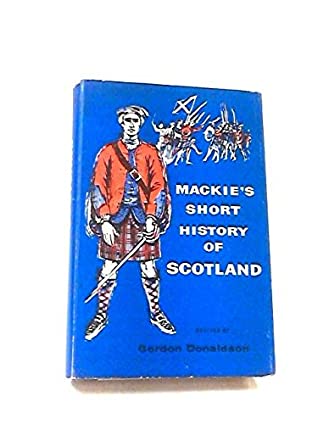

 |

|

The average rating for History of the Scots: Agricultural Revolution to Oil and Nuclear Power Bk. 3 based on 2 reviews is 5 stars.
Review # 1 was written on 2015-01-23 00:00:00 Aaron Klosterman Aaron KlostermanIn the introduction to Scotland in Colour, Wilfred Taylor writes that “the Scot is essentially a romantic logician… At the heart of the Scottish ethos is a hard core of logic, embedded in a matrix of pure sentiment.” This is certainly true of Robert Mackie, author of A Short History of Scotland. He seems never to lapse into nationalistic pride. (He has no problem describing his countrymen of an earlier period as “more ignorant” than their English neighbors, in reference to the old Scottish belief that the English had tails.) But despite his cool, methodical tone, he does occasionally arouse passion. In the closing pages of the book, for example, I was inexplicably drawn to tears by a summary of economic trends since the Industrial Revolution. Perhaps I was merely sad that I would soon finish this delightful book. I started reading A Short History of Scotland shortly after the 2014 Independence Referendum, having been devastated by the results. As an American of Scottish (and English) descent, I could not fathom why any self-respecting Scot would want Scotland to remain part of the United Kingdom. Of course, my first introduction to Scottish history was the inaccurate Hollywood film Braveheart. My position on the question of independence has not changed, but after reading Mackie’s Short History of Scotland, I now understand why many Scots favor the Union. First, there is the Union of the Crowns of 1603. It was actually a Scottish king, James VI, who first became the monarch of both Scotland and England. Surely this is not what King Edward, “Hammer of Scots,” had in mind, and I like to think that he rolled over in his grave when James took up residence at Westminster. At any rate, as Mackie notes, it made many Scots proud, and many Englishmen resentful. Second, the Scots found themselves at a severe economic disadvantage, especially after the failure of the Darien scheme. Joining with England seemed like the only realistic option. Mackie disagrees with Burns when he says that the Scottish officials who accepted the Treaty of Union “were not traitors who had been bribed by English gold to sell the independence of their country, but practical men confronted with the task of extricating their country from an exceedingly perilous position.” I’m still with Burns and Belhaven on this one. I think the Scots should have taken their chances and found their own way out of their perilous position. But I can understand how less independent, more “practical” folks would desire to play it safe and take the easy way out. Finally, there is the issue of education (or, perhaps more accurately, miseducation). Mackie writes that there has been “an English slant to education as conducted even in purely Scottish schools… The notion has been instilled into Scottish children that the two countries share the same past, the same historic heritage, which is by no means true; not only so, but the predominant view of Scottish history has tended to be that of English historians, who regard anything which is not English as quaint, backward, or even (ignoring the tumultuous and bloodstained annals of their own country) as barbarous.” So, many Scottish children grow up without a sense of their own national identity, and think of themselves primarily as Brits, who just happen to be Scots. But, despite all this, despite “[three] centuries of political union,” despite “perhaps ten centuries of southern influence, Scotland still preserves a national identity which may be difficult to define but is none the less real.” In my mind, that’s Mackie’s even-tempered way of saying that the spirit of the Scottish people, which the Romans failed to conquer, which neither Edward nor any subsequent Sassenach could crush, will never be crushed, for it is as indomitable as the individual Scot is stubborn. |
Review # 2 was written on 2013-09-29 00:00:00 John Peterson John PetersonGreat book yet vintage now. |
CAN'T FIND WHAT YOU'RE LOOKING FOR? CLICK HERE!!!